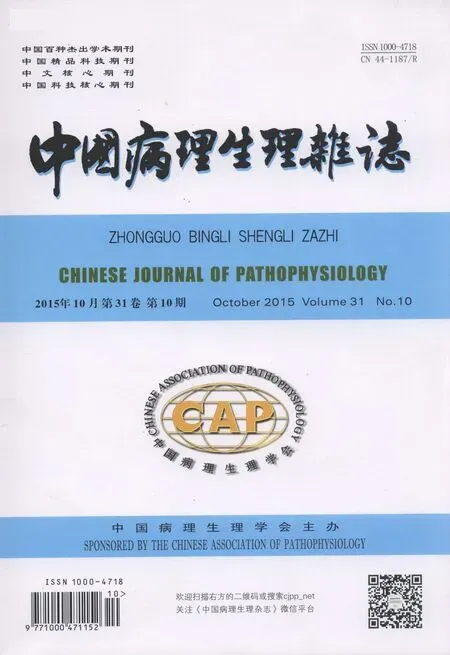乌头碱诱导的心房颤动对内皮素1分泌及其受体表达的影响*
刘丽萍,赵凤娟,张 博,洪 兰,刘 霞,崔 勋(延边大学医学院生理学与病理生理学教研部,吉林延吉133002)
乌头碱诱导的心房颤动对内皮素1分泌及其受体表达的影响*
刘丽萍,赵凤娟,张博,洪兰,刘霞,崔勋△
(延边大学医学院生理学与病理生理学教研部,吉林延吉133002)
目的:观察和探讨乌头碱诱导的心房颤动(房颤)对内皮素1(ET-1)分泌及其受体表达的影响,并观察ET-1下游的信号通路的变化。方法:采用大鼠左心房离体灌流模型,利用放射性免疫技术检测ET-1分泌的水平;利用蛋白免疫印迹法分析心房肌缝隙连接蛋白40(Cx40)、43(Cx43)、ETA型受体(ETRA)、ETB型受体(ETRB)蛋白水平的变化以及MAPK/ERK和PI3K/ Akt的磷酸化作用。结果:房颤时Cx40和Cx43表达明显下调(P<0. 01) ;房颤明显促进心房ET-1的分泌(P<0. 01) ;房颤时ET受体表达呈现异常,ETRA明显上调(P<0. 05),而ETRB则显著下调(P<0. 01) ;房颤时ET-1下游的MAPK/ERK及PI3K/ Akt信号转导发生变化,pERK及pAkt明显上调(P<0. 01,P<0. 05)。结论:房颤明显增加心房ET-1的分泌,并导致其受体及其下游ERK和Akt信号通路的异常表达,这可能与房颤诱导的心房肌结构重构相关。
AIM: To unravel the metabolic phenotype of human hematopoietic progenitor and stem cells (HPSCs).METHODS: Flow cytometric profiling and separation of human MPB cells based on their mitochondrial activity were performed using MitoTracker dyes and used for further analysis of metabolic profiles and underlying mechanisms.RESULTS: We showed that HPSCs had a similar metabolic phenotype,as shown by high rates of glycolysis and low rates oxygen consumption.Fractionation of human mobilized peripheral blood cells based on their metabolic footprint showed that the cells with a low mitochondrial potential were highly enriched for HPSCs.Remarkably,low MP cells had much better repopulation ability as compared to high MP cells.Moreover,similar to their murine counterparts,Hif-1α was upregulated in human HPSCs,where it was transcriptionally regulated by Meis1.Finally,Meis1 and its cofactors Pbx1 and HoxA9 played an important role in transcriptional activation of Hif-1α in a cooperative manner.CONCLUSION: These findings highlight the unique metabolic properties of human HPSCs and the transcriptional network that regulates their metabolic phenotype.
△Corresponding author E-mail: zhengjunke@shsmu.edu.cn
▲These authors contribute equally to this work
Hypoxic metabolism in human hematopoietic stem cells
Fatih KOCABAS1▲,XIE Li2▲,Hesham A.SADEK1,ZHANG Cheng-cheng1,ZHENG Jun-ke2△
(1Department of Internal Medicine,Division of Cardiology,UT Southwestern Medical Center at Dallas,Dallas,TX 75390,USA;
2Key Laboratory of Cell Differentiation and Apoptosis,Chinese Ministry of Education,Shanghai Jiaotong University School of Medicine,Shanghai 200025,China)
国家自然科学基金资助项目(No.81360061)
△E-mail: cuixun@ybu.edu.cn

